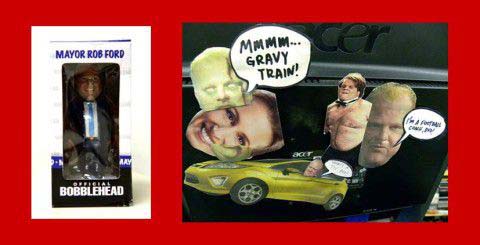Rob Ford & Shadow: 4 Jungian Psychotherapy Insights

Rob Ford, Toronto’s crack-smoking Mayor, dominates the media: but, from a Jungian case studies perspective, one thing we don’t talk about is what Rob Ford shows us about our own collective shadow.

It’s easy to moralize about Ford’s very public, very sensational melt-down: he’s an easy target. What is not so easy or comfortable is the awareness that Toronto elected Rob Ford into his current role. The City of Toronto voted for him, and in many ways, he reflects aspects of the collective shadow of the entire Greater Toronto Area.
I understand that this may seem like an outrageous claim! Let me explain: Rob Ford’s attitudes may be repugnant to us, but they reflect aspects of our collective psyche that we would really rather ignore.
1. Convenient Self-Delusion
T.S. Eliot famously wrote that “humankind cannot bear very much reality.” Many would see the public pronouncements of Rob Ford and his closest supporters as a case in point.
First we’re told that one newspaper has a vendetta against Mr. Ford, which is gradually widened out to the whole press corps and then eventually to the Chief of Police. Similarly, Mr. Ford admits to outrageous public incidents of out-of-control alcohol use, smoking crack cocaine, and driving under the influence, but is in such denial that he seems to genuinely believe that it’s O.K. because “everybody does it”.
It’s commonly held that Mr. Ford maintains these self-delusions to avoid the necessity of threatening change. Yet, dare we look at our own delusions, which allow us to stay locked in behaviors that, on the deepest level, we really know we must change? For instance, how many people in our culture are locked into ever-increasing levels of debt, that they tell themselves will somehow be magically reversed?

2. Them: It’s Their Fault
Related to the above is the tendency to blame or scapegoat others for ills in society or our own lives. When things are going wrong, we can easily blame others or outsiders for the bad developments. Rob Ford is famous for his blaming of “left-wing elites” or the press or “thugs” for social ills or his own personal difficulties.
Prof. Nathanael J. Fast of Stanford University has researched the incredibly contagious properties of blaming and scapegoating others, and the ways in which they can spread with incredible rapidity through an organization or a society.
Many accuse Rob Ford of this kind of scapegoating. But can we see our own shadow, and the ways in which we, too, scapegoat? We do it on a social and political level: we also do it in communities, places of employment — and families.
3. Enable Me — Or You’re No Friend of Mine
Many feel that Rob Ford surrounds himself with people who all reinforce a distorted view of the world. They find this to be particularly true of his family’s apparent denial of his rampant substance abuse issues.
But, we also often surround ourselves with voices that reinforce the way we already see the world, or confirm us in existing behaviour patterns — because it makes us comfortable, even if it’s not true.
4. Without My Job I’m Nothing
Some allege this is the real sticking point in terms of Rob Ford actually leaving the Toronto mayor’s job: without the job, he has no concrete identity to which he can cling . Rather than be nobody, he clings to the mayor role like a life preserver.
We might regret such an attitude in Mr. Ford, if he does indeed hold it. But it might be good to have a very serious look in the mirror. How much of our own identity is tied up with our work persona? Who would I be without my job? Would I feel like I was anybody? These are very serious questions for early 21st century people.
Rob Ford can be seen as a mirror of our own shadow. It’s only through self-compassionately and courageously acknowledging the shadow and the undiscovered self that we can grow towards our own wholeness and completeness, and become rooted in ourselves. This is the heart of the work of individual case studies.
[cta]

Bruce Campbell
Rob Ford could use a session in Douglas Adams’ “Total Perspective Vortex”. As could I.
Brian C
I guess we could all use a little more total perspective, Bruce, and greater consciousness. Thanks for your comment!